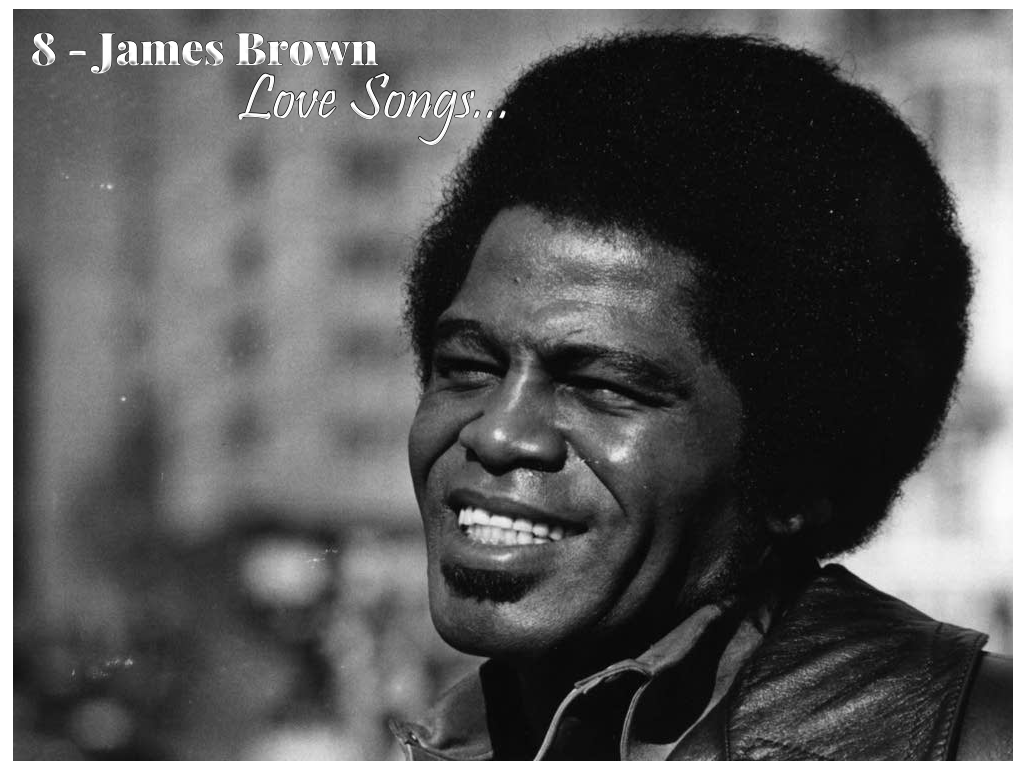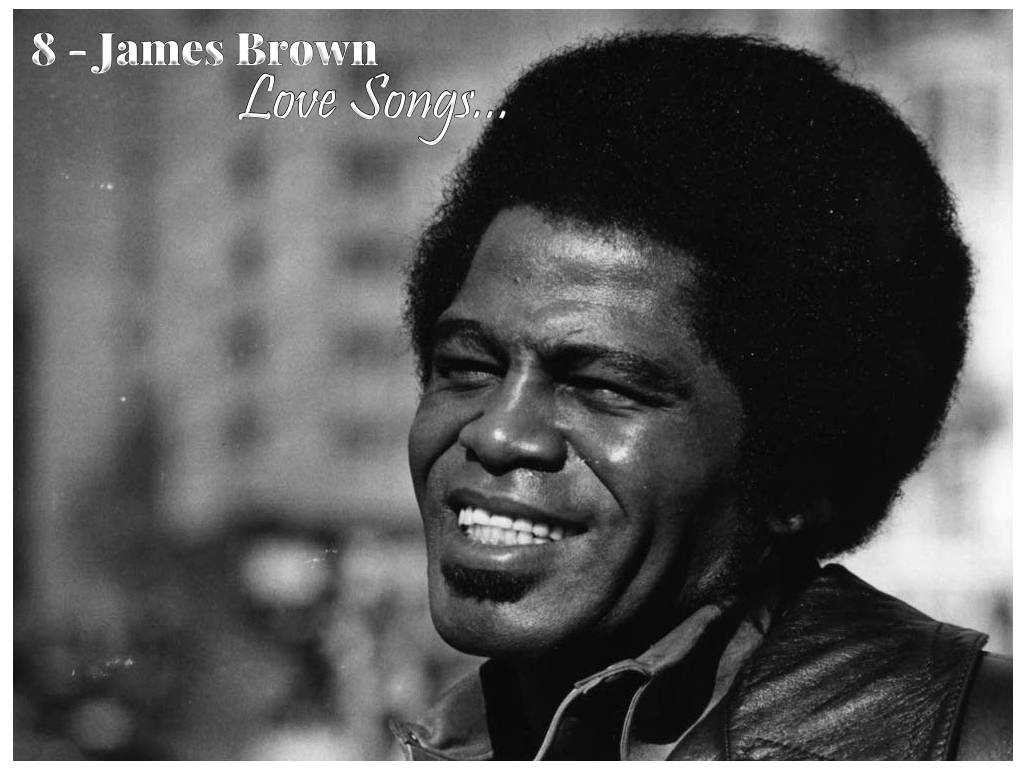-
 play_arrow
play_arrow
Praise 24/7 NO Today's Best Gospel
8 James Brown Love Songs That Show Why He’s the Godfather of Soul.

(ThyBlackMan.com) When most people think of James Brown, they remember the Godfather of Soul as the architect of funk, the tireless showman, and the revolutionary force who redefined rhythm. But tucked throughout his career are some of the most enduring love songs ever recorded in soul music. Before he was the king of funk grooves, Brown was the man who could cry, beg, plead, and woo with a rawness few singers could match. These songs may not always get the same spotlight as his iconic funk anthems, but they showcase Brown’s ability to make love feel urgent, painful, ecstatic, and spiritual. Each of these tracks continues to sound relevant today, offering modern listeners timeless lessons about romance, heartbreak, and devotion.

1. Try Me
James Brown’s first major hit, “Try Me” (1958), is one of his purest love ballads. Here, Brown strips away the bravado and comes across as fragile, almost pleading with the listener to give him a chance. The simplicity of the lyrics — “Try me… and your love will always be true” — cuts directly to the vulnerability at the heart of any romantic pursuit. It’s not about clever wordplay; it’s about sincerity, and that sincerity is what made the song resonate with so many in the late ’50s.
What makes “Try Me” so powerful is Brown’s vocal delivery. He doesn’t oversing; instead, he allows his natural ache and longing to seep through every phrase. The Famous Flames provide gentle harmonies that cushion his vulnerability, amplifying the tenderness rather than overshadowing it. Even decades later, the record carries a freshness because of its emotional rawness — it’s the sound of a young man unafraid to expose his heart.
Listening today, “Try Me” still feels universal. Everyone has been in that place where they’re asking someone to take a chance on them. In an era where dating can often feel like a game, the honesty of Brown’s approach is refreshing. The song isn’t about conquest; it’s about commitment. It’s that kind of openness that makes it one of the most enduring love songs in his catalog.
“Try Me” was more than just a love ballad — it was James Brown’s declaration that he could do more than shout and command. He could also make you feel. It remains a cornerstone of his career because it proved that his music could move you both on the dance floor and in the quiet spaces of the heart.
2. Please, Please, Please
Few songs in James Brown’s career encapsulate desperation in love quite like “Please, Please, Please.” Released in 1956, this was Brown’s first single, and even though it wasn’t a massive hit at first, it became one of his signature songs — a testament to how deeply he could channel the emotion of longing. In this track, love is less about sweetness and more about survival. Brown isn’t asking; he’s begging, and that distinction is what makes the song legendary.
His vocal delivery here is almost operatic in its intensity. He stretches the word “please” until it becomes its own instrument, riding the line between singing and shouting. The repetition emphasizes not redundancy but urgency — each “please” is another heartbeat, another gasp of breath, another plea for connection. Behind him, the Famous Flames’ harmonies and the sparse instrumentation provide just enough framework to highlight his voice, which carries the weight of the entire performance.
For a modern audience, “Please, Please, Please” remains relevant because it captures the raw edge of love. Relationships aren’t always balanced, and sometimes one person finds themselves begging for attention, forgiveness, or a second chance. Brown makes no attempt to hide the indignity of that position — instead, he leans into it, showing the humanity of needing someone that badly. That emotional honesty makes the song timeless.
Live, “Please, Please, Please” became a theatrical event, with Brown dropping to his knees, drenched in sweat, his cape draped over his shoulders as he staggered back to the mic for one more plea. Even if you weren’t the one he was singing to, you felt it. That universality is why the song endures: because everyone knows what it’s like to want someone so badly it drives you to beg.
3. Lost Someone
Released in 1961, “Lost Someone” is perhaps Brown’s most heart-wrenching love ballad. Here, we see him grappling not with desire but with absence. The song stretches over ten minutes in its live versions, giving Brown ample space to wring every ounce of pain from his voice. Love isn’t portrayed as joy or fun here; it’s grief, longing, and emptiness. Brown sings as if the act of voicing his pain is the only way he can endure it.
The arrangement is deceptively minimal, leaving room for Brown’s voice to dominate. He shifts from soft, almost whispered laments to full-throated cries, creating a dynamic emotional landscape that mirrors the rollercoaster of heartbreak. His control — knowing when to explode, when to pull back — is a masterclass in vocal storytelling. This wasn’t just a singer; this was an artist translating love’s loss into pure sound.
For today’s listener, “Lost Someone” remains relevant because heartbreak is timeless. Anyone who has experienced the void left by love gone wrong can relate to Brown’s delivery. The track doesn’t shy away from the messiness of loss; it embraces it, turning suffering into art. That refusal to polish over the pain gives it a raw authenticity that still resonates.
In performance, “Lost Someone” became even more devastating. Brown often stretched it into extended monologues, speaking directly to the audience as if confessing his pain in real time. That intimacy is what makes the song so moving even now. It’s not just a song about losing someone; it’s a song about surviving the loss by letting yourself feel it fully.
4. Prisoner of Love
James Brown’s 1963 recording of “Prisoner of Love” was his attempt to step into the world of pop balladry, and it remains one of his most beautiful love songs. Originally a standard from the 1930s, Brown transforms it into something uniquely his own, infusing it with the raw soul that only he could deliver. Love here is framed as captivity — something that holds you, binds you, and refuses to let you go.
The lush orchestration sets the tone, with strings and horns providing a sweeping backdrop. Against this grandeur, Brown’s voice cuts through with both vulnerability and strength. His phrasing is deliberate, lingering on words like “prisoner” to emphasize the tension between joy and entrapment. It’s a performance that balances tenderness with intensity, creating a love song that feels both timeless and distinctly Brown.
For contemporary listeners, “Prisoner of Love” resonates because it captures the paradox of love — how something that feels so good can also feel confining. In an era where relationships are often described in terms of freedom and independence, Brown reminds us that love can also be about surrender, about giving up control willingly. That idea still strikes a chord today.
Critically, this song showcased Brown’s ability to step outside the funk and soul box and tackle standards with authority. He didn’t just cover a classic; he reinvented it. “Prisoner of Love” stands as proof that Brown’s talent extended far beyond rhythm — he could also be a crooner, capable of melting hearts with a single phrase.
5. Bewildered
“Bewildered,” released in the late ’60s, is another standard that Brown redefined. It’s a song about confusion in love, about being swept away by feelings so powerful they leave you dazed. Brown approaches it with a mixture of vulnerability and fire, embodying the emotional whiplash of being in love and unsure of where it’s going. Few singers could straddle that line between tenderness and intensity as convincingly as James Brown.
The instrumentation is restrained, allowing Brown’s vocals to shine. He stretches syllables, turns single words into emotional journeys, and makes you feel every ounce of uncertainty the lyrics describe. The Famous Flames provide subtle background support, but this is Brown’s showcase — his ability to convey bewilderment not just in words but in tone, inflection, and timing.
Listening today, “Bewildered” feels just as relevant as it did decades ago. Love still has the power to confuse, to leave us feeling vulnerable, to throw us off balance. Brown’s performance doesn’t offer clarity; it offers companionship in that confusion. Hearing him wrestle with those feelings reminds us that bewilderment in love is universal, and that vulnerability is part of the human condition.
What sets this song apart is Brown’s refusal to smooth over the rough edges. Instead, he leans into the messiness of love, making the track a reminder that being overwhelmed by feelings isn’t weakness — it’s proof of how deeply we can connect. In that sense, “Bewildered” is as much therapy as it is music.
6. Good Good Lovin’
If some of Brown’s love songs are about loss or longing, “Good Good Lovin’” is pure celebration. Released in 1959, it captures the exuberance of love at its most joyous and physical. The song is uptempo, brimming with energy, and Brown’s delivery borders on ecstatic. It’s not about begging or mourning; it’s about reveling in the pleasure of being loved and giving love in return.
Musically, the track leans on doo-wop influences, with playful harmonies and a danceable rhythm. Brown’s vocal performance is exuberant, showing off the charisma that would later make him the “hardest working man in show business.” There’s a sense of fun here that makes the track infectious, reminding us that love is not always complicated — sometimes it’s simply about joy.
For modern listeners, “Good Good Lovin’” works as a reminder that love doesn’t have to be weighed down by drama. In a cultural moment where music often emphasizes heartbreak or toxicity in relationships, Brown’s song is refreshingly positive. It’s a track you can still dance to, smile to, and let lift your mood instantly.
Live, Brown could stretch “Good Good Lovin’” into a party anthem, engaging the crowd and amplifying the joy. That energy still comes through today, making it a song that not only celebrates love but also invites the listener to celebrate with him. It’s love as pure exuberance, and that’s something timeless.
Finish story here; 8 James Brown Love Songs That Show Why He’s the Godfather of Soul.
Written by: Black Gospel Radio
-

Praise 24/7 Commercial Free
For every Show page the timetable is auomatically generated from the schedule, and you can set automatic carousels of Podcasts, Articles and Charts by simply choosing a category. Curabitur id lacus felis. Sed justo mauris, auctor eget tellus nec, pellentesque varius mauris. Sed eu congue nulla, et tincidunt justo. Aliquam semper faucibus odio id varius. Suspendisse varius laoreet sodales.
close Top popular

The Science of Happiness – Exploring Factors for Well-Being

Balancing Act: Prioritizing Your Well-Being in a Busy World

Overcoming Procrastination – Strategies for Productivity and Success

Unlocking Hidden Potential – A Guide to Personal Growth

Mindful Living – Cultivating Presence in the Modern Era

CONTACT US
- info@praise247no.com
FOLLOW US
- Praise247NO
- Praise247NO
- Praise247NO
Copyright 2024 Praise247no.com - All Rights Reserved.




Post comments (0)